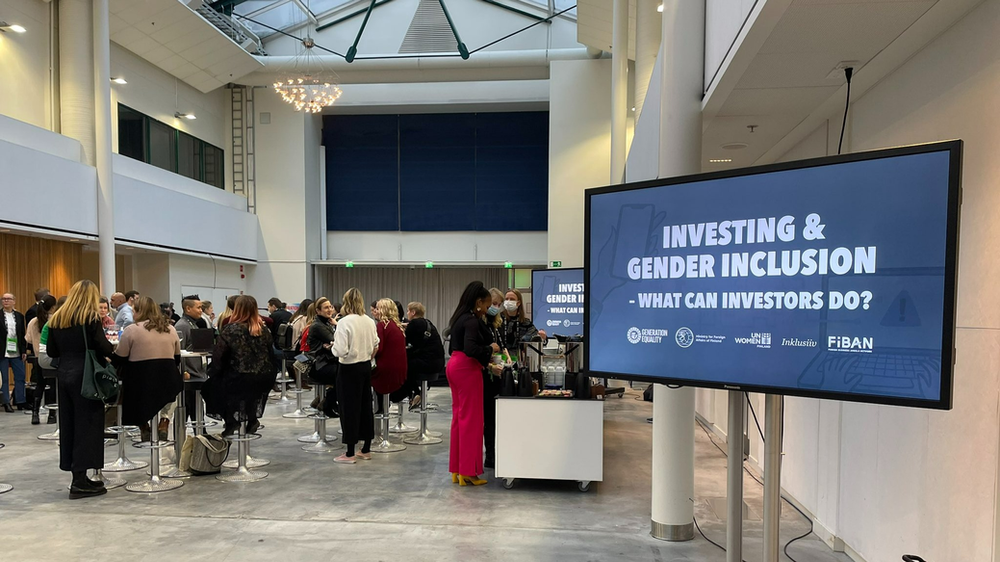The importance of diversity has been acknowledged as a powerful tool for better returns in the startup scene. Yet, several studies show that we don’t seem to make progress in gender equality in investing. Why? It was the topic for the Slush side event Inklusiiv co-organized in collaboration with the Ministry for Foreign Affairs of Finland, UN Women Finland, and FiBAN (Finnish Business Angels Network) as part of the Generation Equality campaign. Here are the key takeaways from the event discussion.

Recent studies show that over 90% of funding in the Nordics and Europe goes to all-male founding teams. According to a report by Unconventional Ventures, all-women founded startups raised just 0.7% and mixed teams 7.3% of investments in the Nordics in 2020. The 2021 State of European Tech report tells the same story: the total capital raised by all-women or mixed teams in Europe was 9.9%. Both studies conclude that the situation is not improving and the progress is either flat or backward. The State of European Tech report adds that the slow progress on diversity and inclusion is capping the addressable market for ideas and talent.
What is standing in the way of women getting more funding? And what can investors do to change the course of this? We addressed these questions at the Slush side event organized by the Ministry for Foreign Affairs of Finland, UN Women Finland, Inklusiiv, and FiBAN on 2 December at Messukeskus Valo venue.
The event was part of the Generation Equality -campaign coordinated by UN Women, aiming to remove systemic barriers to gender equality and speed up the realization of the rights of women and girls. Finland leads one of the campaign’s six Action Coalitions – Technology and Innovation for Gender Equality. One of Finland’s primary goals in the initiative is to increase women and girls’ number, participation, and leadership roles in science, technology, engineering, and math.
It’s not a pipeline issue
The event started with a fireside chat where Sifted’s Eleanor Warnock interviewed Deepali Nangia, Venture Partner at Speedinvest, Atomico Angel and co-founder of Alma Angels. Alma is a community of angels with a mission to level the playing field for female founders seeking early-stage funding.
In the chat, Deepali pointed out that it’s not a pipeline issue anymore as is commonly believed – she meets talented women founders every day eager to build large scalable businesses. One thing preventing women from getting funding is the lack of access to networks, knowledge, and early-stage funding. That is why Deepali founded Alma angels with three other co-founders to create a two-sided marketplace where women could apply for funding without having to overcome any of the typical barriers to entry.
“Most funds don’t even know the number of women that apply or how many go from cold application to a shortlist and then to a long list. We have started to measure the entire pipeline and also look at our internal processes to see where the biases exist.” –Deepali Nangia
Deepali has three pieces of advice for women founders: reach out and dare to ask for help, stay persistent even if you get ‘no’ for an answer (after all, you only need one ‘yes’), and leverage your existing networks. It’s also important to focus on pitching the storyline and having a clear mission and values as impact companies are something that today’s investors are looking for – and something that all-women and mixed founding teams are 73% more likely to build according to the Unconventional Ventures report.
Gender equality in investing is not complex but it can be difficult
After the fireside chat, the conversation continued with Jyrki Pulkkinen, the Ambassador for Innovation at the Ministry for Foreign affairs of Finland, and Kaisa Alavuotunki, Impact and Sustainability Director at Finnfund, who spoke about the role of projects such as Generation Equality and the importance of highlighting the business benefits of investing in women.
The event ended on a high note with a panel discussing the concrete actions needed to bridge the funding gap. This top-notch panel included Andreas Helbig, Senior Associate at Atomico, Daisy Onubogu, the Head of Network and Communities at BACKED, Dora Palfi, the Co-founder and CEO at imagiLabs, and Milja Laakso, the UNICEF Venture Fund Lead. Reetta Heiskanen, the Platform and Marketing Manager at Maki.vc, led the discussion.
Daisy Onubogu pointed out that the issue of investing in more women founders is not complex but can be difficult. Investors need to make time for new activities, such as taking a critical look at their data to know where to start and spot the cracks in their processes.
“Nobody cares about your good intentions. They care about what you have or haven’t done.” -Daisy Onubogu, the Head of Network and Communities at BACKED
Daisy added that it’s getting harder for investors and institutions to hide behind the words of ‘just having good intentions’ as there are programs, policies, processes, and best practices in place to improve the situation. At this point, they are either included by doing the actions to bridge the funding gap or excluded if they are not – and this peer pressure can accelerate the needed change.
Making a public commitment and setting measurable goals help investors to stay accountable
How can VCs and investors hold themselves accountable? One thing that Andreas Helbig brought up was being vocal about your commitment to bridge the funding gap and invest more in all-women and mixed teams. Another thing helping with accountability is setting clear goals and measuring how you succeed in achieving them. As Dora Palfi pointed out, what gets measured, gets done.
“We have a diversity policy on our website. We put it out there and if we don’t live up to that, people can come to us and say that we don’t live up to our standards.” -Andreas Helbig, Senior Associate at Atomico
Milja Laakso highlighted the importance of inclusive communications and practices. Creating communications and marketing that encourage women to apply and pitch their ideas can make a difference. According to her, another important thing is to make sure that diverse teams and women founders are included in the demo stage and given opportunities.
However, public commitment alone is not enough. Dora reminded that merely encouraging women to apply is not enough as women tend to fall out too early from the pipeline. This is why it is crucial to gather data to find out what happens in the early stages of the funding process. Daisy added that indeed it is not enough to indicate that everyone is welcomed. Instead, VCs should establish a more inclusive pipeline process and build a real connection with women founders.
One way of encouraging women entrepreneurs and investors is to make successful women founders and positive stories more visible, as Dora said. It’s also important to highlight the business benefits. Investing in diverse teams is not a nice thing to do – it’s a smart thing to do.
This discussion focused on gender equality in investing but we need to bear in mind that also other underrepresented groups face structural inequalities when it comes to funding. The 2021 State of European Tech report showed that ethnic minority teams face heightened barriers to funding as well: of the total amount of funding raised by companies in the study’s sample, only 1.3% went to ethnic minority founding teams. Let’s also remember that gender is not binary – this discussion should take into account all genders and their experiences.

Reetta Heiskanen, Daisy Onubogu, Dora Palfi, Milja Laakso and Andreas Helbig in the panel discussion.
Read UN Women Finland’s summary of the gender equality in investing event discussion here (in Finnish).
